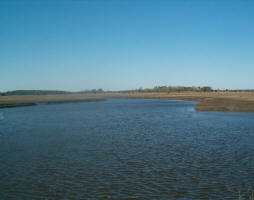 Arab experts to review climate change ahead of Copenhagen
Arab experts to review climate change ahead of Copenhagen
A team of Arab experts will be formed this month to document the impact of climate change on the Arab region in order to unify Arab states’ stance on the phenomenon ahead of a global conference in November.
The group will be tasked with compiling a report on the effects of climate change on the Arab region, which is highly vulnerable to the phenomenon due to its arid climates, prior to the UN Climate Change Conference in Copenhagen in December.
The report, which will also detail international contributions to climate change, is to be presented during the Arab Environment Ministers Council meeting next month in Cairo.
The measure comes in response to a suggestion raised by Jordan during the 42nd meeting of the Arab Environment Ministers Council's executive bureau held last week in Cairo.
Minister of Environment Khalid Irani said yesterday that Arab countries must unite their stances in addressing climate change.
"It is vital to head into the UN Climate Change Conference in Copenhagen carrying a clear and unified vision regarding the impact of climate change on the Arab region and needed measures to address them, as well as the required international commitments to limit the phenomenon's impact," Irani said in a press statement released yesterday.
The conference, which will be held in Copenhagen from December 7-18, is expected to yield a climate change deal building upon the first phase of the UN's Kyoto Protocol, an international and legally binding agreement to reduce greenhouse gas emissions worldwide which is set to expire in 2012.
Climate change is a concept referring to the variation in the Earth's global climate or in regional climates over time. It describes changes in the variability or average state of the atmosphere over timescales ranging from decades to millions of years.
The region, home to dry and arid climates, is one of the most vulnerable regions to the impact of climate change.
Arab states face several threats due to increased drought and desertification, scarcity of water resources, increased salinity of groundwater, and the spread of pest epidemics and diseases caused by the phenomenon, according to previous declarations by the Arab Environment Ministers Council.
So far, climate change has caused a 30 per cent reduction in the country's surface water resources, as well as a decrease in the volume of rainfall and agricultural production, both of which the country and the Arab world heavily rely on.
If climate change continues at its current pace, Jordan is expected to witness increased temperatures by 1-2 degrees Celsius by 2030-2050, diminished aquifers and oases, reduced green cover and the transformation of semi-arid lands, some 80 per cent of the country's total area, into arid deserts, according to environment experts
| Contact information |
Hana Namrouqa
|
|---|---|
| News type | Inbrief |
| File link |
http://www.jordantimes.com/index.php?news=20662 |
| Source of information | Jordan Times |
| Keyword(s) | climate change |
| Subject(s) | METHTODOLOGY - STATISTICS - DECISION AID , POLICY-WATER POLICY AND WATER MANAGEMENT , RISKS AND CLIMATOLOGY , WATER DEMAND |
| Relation | http://www.emwis.net/topics/climatechange |
| Geographical coverage | Jordan, Arab countries |
| News date | 05/11/2009 |
| Working language(s) | ENGLISH |
 you are not logged in
you are not logged in





